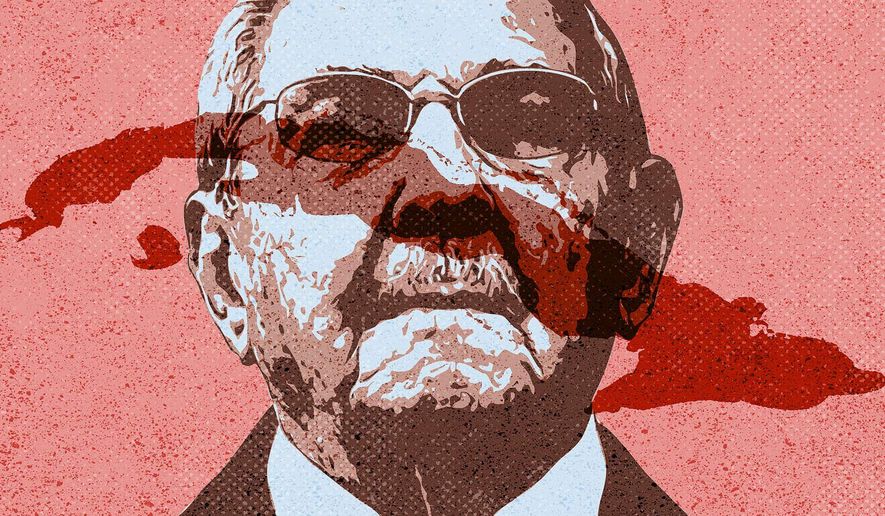OPINION:
Last week, many mainstream media outlets reported Raul Castro’s recent resignation at the Eighth Congress of the Communist Party of Cuba as a sign the totalitarian regime was taking a decisive step toward reform.
This was possible only because many Americans are unaware that Cuba has spent decades engaging in tactics inspired by far-right fascist regimes, and this methodology is deeply ingrained in its political culture and system.
I learned this after nearly four years of working as a White House appointed official for the U.S. Office of Cuba Broadcasting in Miami, where I closely observed Cuba’s legal system and the Kafkaesque methods it uses to suppress and torment its citizens.
I grew up in South Florida not far from the Cuban exile community in Miami. I associated the Castro regime with an effort to build socialism on the principles of the 1959 revolution.
But in reality, Castro built his new “revolutionary society” with the same tactics of fear, harassment and intimidation Nazi Party leaders used in the 1920s and early 1930s during their rise to power in Germany.
Like the Nazi Party, the Castros promoted an Orwellian-style morality that institutionalized and sanctioned criminal behavior against devalued citizens.
While fascists like Franco and Mussolini targeted enemies of the state, and Hitler rallied his followers against non-Aryans, Castro used these tactics to justify persecution against enemies of the so-called Revolution.
Just as the Nazis recruited members under the banner of anti-Semitism, the Castros created a new wave of followers to help them identify, target and persecute “counter-revolutionaries.”
To achieve this goal, Castro created thousands of island-wide “neighborhood committes” (Committees in Defense of the Revolution) to report on “counter-revolutionary” activity, purportedly to protect the Revolution, just as Hitler used his “Sturmabteilung” Brownshirts to supposedly “protect” party members.
But in reality, “neighborhood committees” are no different than what Nazi Brownshirts really were — state-sponsored gangs that psychologically torment civilians through harassment, intimidation, vandalism and violence.
In Cuba, these acts are encouraged by police in government-sanctioned “Acts of Repudiation,” a Castro ritual in which regime supporters intimidate and threaten the victim’s family in the form of a home invasion without police interference.
The regime also lines up schoolchildren to ridicule democracy activists at their homes, similar to how Hitler youth were used to disrupt church groups.
The Castros spent decades morally justifying this cruelty by dehumanizing dissidents as politically impure “worms” just as the 1940 Nazi propaganda film, “The Eternal Jew,” associated Jews as unclean, racially impure rats.
But these similarities should surprise no one since, in his university days, Castro was seen by student leaders conspicuously carrying Hitler’s “Mein Kampf.”
In fact, the title of Fidel Castro’s infamous 1953 trial speech, “History Will Absolve Me,” mimicked Hitler’s 1924 trial closing argument, that he would be acquitted by the “eternal court of history.”
In 2012, declassified German intelligence files revealed Castro personally approved a plan to recruit ex-Nazi SS officers to train Cuban ones.
Bodo Hechelhammer, the historical investigations director for the German Federal Intelligence Service, said, “the Cuban revolutionary army did not fear contagion from personal links to Nazism, so long as it served their own objectives.”
Castro also utilized far-right extrajudicial methods, such as “pre-criminal social dangerousness,” which enables the state to sentence civilians to prison before criminal activity has actually occurred.
Franconian Spain used the charge of “social dangerousness,” and Nazi Germany used the “tactic” of preventative arrest.
According to the U.S. Holocaust Memorial Museum, by the end of 1939 more than 12,000 German prisoners were interned in concentration camps under the Nazi legal doctrine of “preventative arrest,” without judicial review.
Last month, Cuban Prisoner Defenders reported about 11,000 civilians are currently jailed for “pre-criminal” charges.
The result of the Castros’ decades-long misguided, dehumanizing morality and system of extrajudicial punishment is a Cuban society that lives in fear with its citizens never knowing if even mere inaction will result in imprisonment or violence.
This misguided morality is safeguarded by a system that has infiltrated all levels of society from the Cuban Communist Party elite to its street level neighborhood committees and elders who cling to the failed Revolution along with their children who endure indoctrination.
As such, fear will continue to rule the island regardless of whether Cuba’s “president” or Communist Party secretary general is a Castro or anyone else, and will only change when its cruel “revolutionary” framework is completely destroyed.
• Jeffrey Scott Shapiro is a lawyer and the former director of the U.S. Office of Cuba Broadcasting.




Please read our comment policy before commenting.